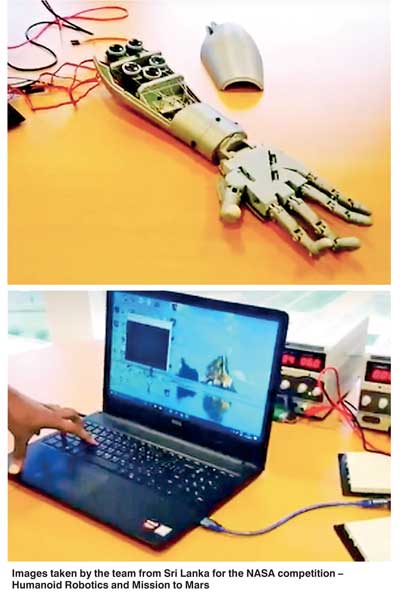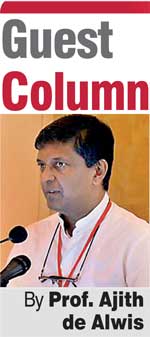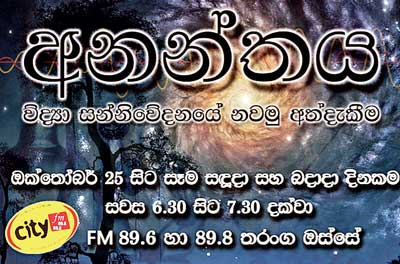Monday Feb 16, 2026
Monday Feb 16, 2026
Thursday, 8 February 2018 00:00 - - {{hitsCtrl.values.hits}}
Listening to Science in Sri Lanka over the airwaves as you travel back home after work? Well, all of us know that it is not possible to find such a program easily, if at all. With so many of our citizens out of touch for so many years, mere availability of a science program is not going to drive listeners by the droves to one program either.
Sri Lankans today are easily hooked by an astrologer and are ready to stop work if someone mentions a particular planetary alignment. No qualms however for getting paid for all the non-work times and time spent preparing for yearend tsunamis and earthquakes. There is never a personal apology for publicising nonsense and for having misled millions.
Ananthaya
However, today there is a radio program in Sinhala on Sri Lanka Broadcasting Corporation’s CityFM channel (89.3 or 89.6) on Monday and Wednesday from 6.30 to 7.30 p.m. – evening time for on your way back! Some, during very early days, stated that FM represents the Funeral of Media, but I have a feeling that because new-comer FM channels were minus any programs of worth and was directing with programs for a different generation and the mixing of languages with not much respect for any of the languages, was a significant factor in the labelling.
Ananthaya is coordinated by COSTI of Ministry of Science Technology and Research and for the first broadcast, the Minister of Science Technology and Research himself participated, as last year the ministry took a leadership role in celebrating the World Science Day, which falls on 10 November. The space for the program has been graciously supported by the SLBC.
The program started coinciding with the World Science Day in November. If we switch channels on the radio, this may be the only channel still discussing and contributing to improving the scientific awareness of the public. You have various experts from many institutions contributing to the discussions with each day a special topic being addressed. Ananthaya expects to cover topical issues as well as emerging sciences to get the society to move up the science literacy scale. I had the interesting experience of meeting a talented experimentalist as well as quite an articulate speaker when a debunking science myths program took place for Ananthaya.
A platform for the youth
He brought in specialised knowledge and it was obvious that his interests span many subject areas and it was quite a pleasure to note his competence in both Sinhala and English. The radio program is primarily in the Sinhala language as there is significant paucity of science broadcasts in Sinhala.
The young displaying such expertise and versatility was quite welcome and the fact was his presence enriched the program for the day significantly. The young getting their voices and ideas heard was quite welcome. We are not exactly well known for reaching out to the ‘young’ for ideas and feedback. How many times do we say that youngsters with ideas are shot down for dreaming too much? How can one progress with people who are merely passing time with precious little to offer but may be quite vociferous when their requirements are not met? Damith K. quite ably tackled the concept of pseudo knowledge systems and also was very precise in describing that the concept of western science too is erroneous.
Talent loss
It was some events that he described subsequently that really caught my attention. With talent boxed in with little or no opportunities there is a high chance of skilled youngsters disappearing from the country – a disappointed lot.
He and his team had been involved in a global competition in robotics. The competition had been to crowd source talent for techniques and ideas for the Mars mission of NASA based on humanoid robots. As per Damith, the Sri Lankan team had been placed in 70th place from 340 teams with teams from Japan coming on top.
In the first round, from 1400 team entries, they beat teams from India and Malaysia to enter the second round which was in USA. He feels that with a few more resources they really could have done better, but the experience had been very useful.
The winning teams had been literally swept off their feat to jobs in USA. What was interesting to hear was that offers for employment had come from other private sector entities in USA and today, Damith’s team, except for him, are all domiciled in USA. Now this is talent lost.
A recent news item proudly claimed that annually, on average, 10,000 young students take wing to Australia for their studies and Australia had been quite satisfied with the foreign exchange inflows from educational services. I am quite sure in the cases of most, that they are unlikely to return to serve society.
Generation X is more independent and with definite views and aspirations and serving one’s country I’m sure is not a factor in decision making. This was moving with money to get education of the young.
However difficult this scenario may be, going back to an era of foreign exchange curtailment is not an idea to entertain. It was interesting to see the open viewpoint that with direct flights to Melbourne, this year is going to be better than 2017. Now the question is better for whom?
Regaining the confidence of the population
The business plan for direct flights appears only to support an ever-worsening trend. The lesson should be when human capital and money both vanish to the outside, what steps need to be taken to get the confidence of the population back, as you cannot blame individuals for their decisions but must reason out with the internal status for the disaster quietly unfolding.
Census and statistics data reveal that more than 6500 professionals have migrated overseas over the year 2016. It is not surprising to find young students who openly aspire and plan to work overseas after studies. Parents as we know sell whatever they have to fulfil their parental obligations and to give the best in education to their children. Some youngsters say quite strongly and openly that they find that they see no future here in the country after their higher studies. We speak of education to uplift the society but it appears that the script for the act is different. Leaders and decision makers must understand these social trends if they are sincere about their role in society. I remember quite well when the Divisional Head of WIPO, who is in charge of the Global Innovation Index Report, visited Sri Lanka, the question asked from me after spending only a few hours in the island. He asked from me why our newspapers – he arrived on a Sunday to the island and had looked at what was available to him at the hotel – place so many advertisements enticing people to go abroad! Anyone with a decent commonsense understands that when a country’s human capital is in an outflow mode and especially the ones that have substance and the potential, the country is looking down the barrel of a heavily loaded gun.
After the Ananthaya program, I had a little discussion time with Damith and what he told me was quite troublesome. Now these are young minds with proven talent. They definitely do not carry any titles – pre and post to their names yet – and are definitely not members of professional bodies or elite gatherings.
As per Damith, Sri Lanka has only nine years to get it right. Yes – nine years only for Sri Lanka to get the act right and he made this comment quite forcefully and with conviction. I did not have much time to get behind the reasoning but hoped to one day.
Yet those ideas matter, as these youngsters are more at home with globalisation and change. They are quite savvy in this flat world. His specialty is communication engineering and robotics had been one of his interests.
Well, we know a committed well-planned decade can really deliver as shown in Deming’s time in Japan after the war and Mashelkar’s India after economic liberalisation.
Now it must be remembered that Sri Lanka came 70th in the competition and yet all their team members found jobs in USA with attractive offers from head hunting industrial entities.
One could only guess about those between the top and the 70th place. Yes, we know that the typical home-grown American STEM professional is now missing and it is overseas people who mainly fulfil demand. The world’s no. 1 economy is hungry for talent. We are only hungry for meaningless discussions and plans.
We just do not have the passion for execution and one day we will observe that the nation had been haemorrhaging for quite some time. Our passionate attachment to democracy in its present format must be light entertainment for Westminster; not that they are doing great either.
With the US President admitting that he is tweeting at times from his bed – which incidentally has plenty of potential impact – technology is winning and an incoherent social media perhaps is the modern day equivalent to Rule Britannia!
This is just one example I happened to overhear in a direct meeting. Much more is surely happening. The words still reverberate in my mind – Sri Lanka has only nine years. Listen to the young? Are we to ignore them at our peril?!